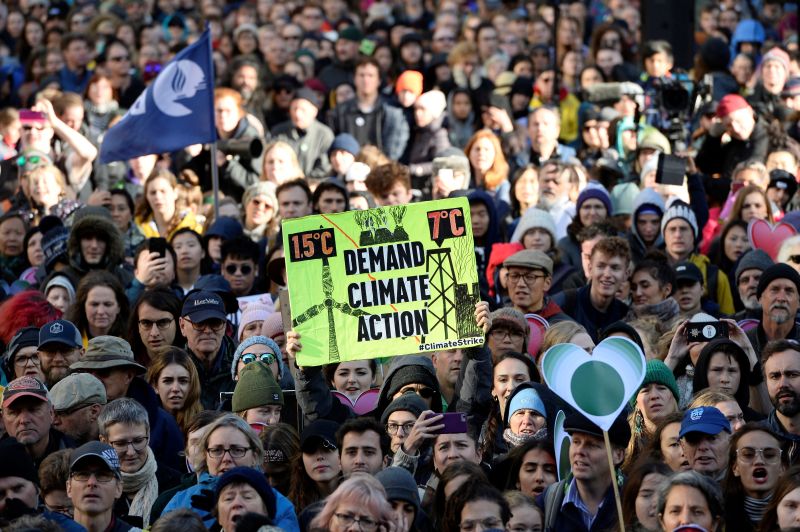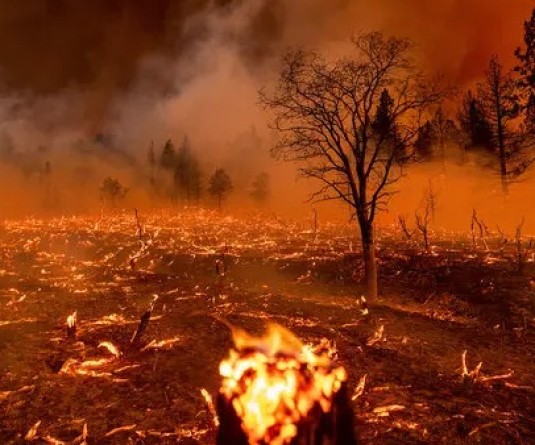Uncertainty over UN talks must not delay climate action, green groups say

A crowd of thousands march in a climate strike featuring climate change teen activist Greta Thunberg in Vancouver, British Columbia, Canada on October 25, 2019. (REUTERS Photo)
BARCELONA, October 31 (Thomson Reuters Foundation): A surprise decision by Chile, rocked by violent unrest, to withdraw as host of December's U.N. climate conference risks throwing international efforts to ramp up action on global warming off course, environmentalists and rights activists fear.
They urged quick efforts to reschedule the negotiations, aimed at accelerating cuts in planet-warming emissions and helping vulnerable communities find ways to deal with the increasingly harmful impacts of climate change.
The announcement by Chile's president on Wednesday came just over a month before the negotiations - known as COP25 - were due to start and left the U.N. climate change secretariat scrabbling for an alternative venue.
With so little time to reorganise an event that attracts more than 20,000 people, a spokesman for the U.N. body told the Thomson Reuters Foundation the annual conference may have to be postponed until next year.
Climate Action Network International, which represents hundreds of environmental campaign groups, warned Chile's move "must not detract from the political urgency to address the climate crisis" through emissions reductions and stronger efforts to adapt to wilder weather and rising seas.
"These are essential ingredients for climate justice. The postponing of the COP must not be used as an excuse to delay this," the network said in a statement.
Manuel Pulgar-Vidal, head of climate and energy work for conservation group WWF and president of the 2014 talks in Lima, called for a fast U.N. response in announcing updated plans for the conference.
“We encourage world leaders to continue to support the process and show it by stepping up their own country pledges, to ensure an extremely ambitious 2020,” he added.
Under the 2015 Paris Agreement, governments have committed to regularly strengthen targets in their national plans to lower planet-warming emissions, in order to meet global goals to curb rising temperatures.
They are due to submit their first revised plans by the end of 2020.
Ahead of that, the COP25 meeting is tasked with finishing work on the Paris pact rules, including those that will govern carbon markets.
A U.N. climate secretariat (UNFCCC) spokesman said the conference could be held at a U.N. building or in another country if a government offers. Preferably the meeting would happen in December as planned, he said.
But the logistics and cost of hosting a COP are daunting, and Costa Rica - where a preparatory meeting for the Chile gathering took place recently - said on Wednesday it could not take on the challenge.
The conference could be hosted in Germany, as the UNFCCC office is located in Bonn and interim sessions are held there each year, but that would require an invitation from the German government, the spokesman said.
KEEP TALKING
Human rights and green groups also expressed concern about what the cancellation of the event in Chile might mean for ongoing protests there, which have resulted in close to 20 deaths, 7,000 arrests and business losses of about $1.4 billion.
They urged Chilean leaders to consider environmental issues as part of reforms to meet the demands of protesters, who want the government to address social inequalities.
Chilean President Sebastian Pinera said on Wednesday he had taken the "painful" decision to cancel COP25, as well as an Asia-Pacific economic summit next month, to focus on restoring law and order and pushing through a new social plan.
The United Nations has said it will send a team to investigate allegations of human rights abuses by Chile's security forces during the unrest.
"The same flawed economic policies that have sparked protests on the streets of Chile are fuelling the global climate crisis and the global inequality crisis," said Asier Hernando, deputy director of Oxfam in Latin America and the Caribbean.
"Urgent action is needed by governments to build economies that put people and the environment before economic growth and corporate profits,” he added.
Some climate change experts and diplomats said they understood the decision not to host the U.N. climate talks in Chile given security concerns and the need to focus on domestic problems.
Others, however, warned the decision should not shut down debate on environmental and social injustices in the troubled Latin American nation and beyond.
“Postponing a meeting doesn't postpone climate change and its impacts," said Jennifer Morgan, executive director of Greenpeace International.
"All over the world, people are clamouring for change. The channels for dialogue have to be kept open," she added.




